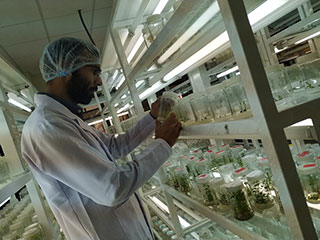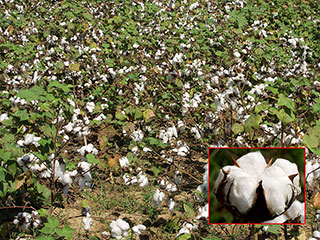Contributing to the Development of Land and Local Communities
Expanding sales of fishing net copper wire for fish farms

Opening up the future of fisheries with new materials
Working to expand the use of copper wire fishing nets for fish farms
We are focusing on expanding sales of fishing net copper wire for fish farms to major aquaculture system companies in the United States and major fishery companies in Japan. Here I will explain the background and initiatives for capturing demand for changing from existing steel nets and chemical fiber nets.
What are fishing net copper wires for fish farms?
At present, the standard nets used in fish farms are of two types: steel nets and chemical fiber nets. These fishing nets accumulate algae over time when they are immersed in the ocean, and if the parasites produced in the algae attach to the fish, the fish may no longer be marketable. Algae covering the nets may also impair the flow of water in the fish preserve, reducing fish growth. However due to the characteristics of copper, copper wire has superior resistance to algae and bacteria, and it has been proven to prevent the formation of algae and increase fish yield and growth rate. Because its advantages enable fish to be raised faster, larger, and more efficiently, we aim to expand sales of this fishing net copper wire to capture demand for changing from existing steel nets and chemical fiber nets.
Reason for becoming involved in this business
We learned that a high-performance materials manufacturer that we do business with was considering exporting copper wire materials for fish farms to companies in the United States, and we began studies once we agreed to participate. Copper wire nets can be recycled after use, and because the material itself is used, it can be resold in a form that has recycling value. As a result, compared to steel nets coated with anti-rust treatment or chemical fiber nets, they are superior in terms of environmental performance and economics. For these reasons, we decided to enter this business.

NST functions as a coordinator, purchasing copper wire and processing it in Japan, maintaining its function and strength, and selling it in Japan and overseas. As a sales policy, NST considers the areas where needs are present and then takes action. In recent years, the growing global population and increasing consumption of fish has produced problems such as overfishing, and the transition to a sustainable fishing industry has become a critical issue. These conditions have resulted in a reexamination of production by fish farming, and because this fishing net copper wire for fish farms can increase the growth rate, we are focusing on it as an area that can contribute to sustainable fishery development from the perspective of SDG No. 14 “Life below water.”
Future prospects
In addition to sales to companies in the United States, we are now carrying out sales activities for use in projects with companies in South America and major Chinese food product manufacturers. We are also conducting verification testing for use at an aquaculture company which is a subsidiary of a Japanese food product manufacturer. While paying close attention to the global background, we are engaged in sales activities aimed at expanding the use of fishing net copper wire for fish farms in order to pioneer the future of fisheries with new materials.
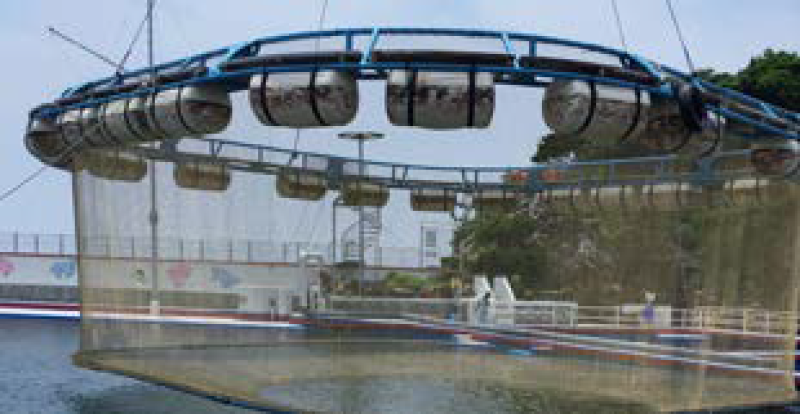
Overseas Industrial Park Projects

Through the development and operation of industrial parks, and associated business supplying electricity, water, and drainage, NST is providing full support to Japanese companies entering overseas markets. We have gained much expertise through our more than 30 years of our involvement with operation of the Rojana Industrial Park, one of the largest in Thailand.
The Rojana Ayutthaya Industrial Park in Thailand employs 100,000 people in Ayutthaya, and has grown in area to be the third-largest industrial park in Thailand
When I look at the numbers, I can sense the importance of the role that our company has played in industrial park projects, and I feel a large sense of accomplishment at the scale of the industrial park. Although corporations of a wide range of sizes operate at the industrial park, the largest companies employ more than 5,000 local employees. In particular at the Rojana Ayutthaya Industrial Park in Thailand, the overall industrial park employs a total of 100,000 local people, and has made a large contribution to regional development.
Difficulties in the growth process
In October 2011, the Rojana Industrial Park suffered unprecedented damage from flooding. At that time I gained a renewed recognition of the threats that natural disasters pose, and of the missions of the companies which protect the human and production infrastructure.
Since the flood, each year during the rainy season we share flood-related information based on simulations conducted by the consulting company TEAM with the corporate residents of the industrial park.
- We received advice from the Japan International Cooperation Agency (JICA) indicating that when the new embankment was constructed, it should have extra height of 6.05 m above the maximum water level during the 2011 flood.
Based on this, we have constructed a new flood embankment that is 6.05 m above sea level and stretches for 73 km around the periphery. - Flood gates have been installed in two locations using funds provided by Japanese government ODA. These prevent backflow of water into the Khaomao Canal when the water level rises during the rainy season.
- All entrances (9 locations) have been raised to the same height as the flood embankment of 6.05 m above sea level.
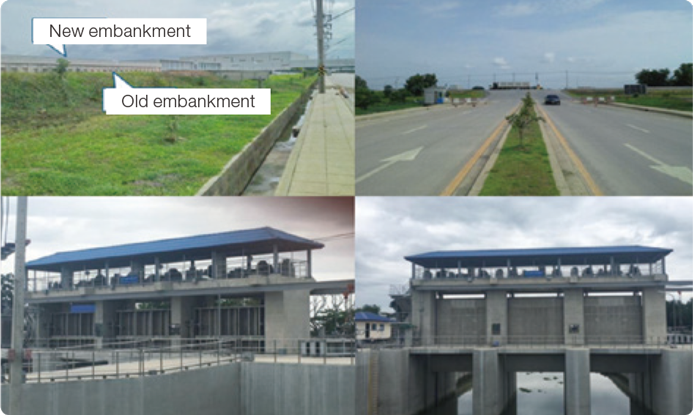
Provision of clean and stable infrastructure is essential
From the early days, the Rojana Industrial Park began supplying power generated by natural gas to its customers. Today we provide a stable supply of clean, environmentallyfriendly energy to the local power authority from our solar power business.
As the trend towards addressing global SDGs also accelerates, our company is putting greater efforts into development of our renewable energy business. Mexico in particular has an environment that is well-suited to solar energy production utilizing its ample sunlight and large tracts of land at reasonable prices.
Our company utilized subsidies from the Ministry of Economy, Trade and Industry to conduct a commercialization study for possible provision of a distributed solar power generating service to the 200 corporate residents (of which 70 are Japanese companies) at the Lintel Industrial Park in Mexico. Unfortunately the commercialization project has been delayed due to the effects of COVID-19, however as we wait for the pandemic to end, we continue to study demand from Japanese companies.
Future prospects
Due to the COVID-19 pandemic, it continues to be difficult for people to travel overseas from Japan to examine industrial parks. In order to help customers who are considering business in Thailand but are unable to come to examine the actual site, our company has begun making site proposals utilizing aerial video shot using drones. We would like to expand the industrial park total support functions that we have developed in Thailand to other countries.
We are engaged in sales at Lintel Industrial Park in Mexico and at Phu My 3 Specialized Industrial Park in Vietnam. In addition to gaining further experience and capital participation in industrial parks, we would also like to contribute to regional development by becoming involved in general electricity, water supply and sewage, and logistics infrastructure business at these places in the same way we do at the Rojana Industrial Park.
Efforts Toward Distributed Solar Power Generation

NST has been providing stable, environmentally friendly clean energy through natural gas and solar power generation in the Rojana Industrial Park in Thailand, which NST has been operating for more than 30 years. In Japan, too, we operate the mega-solar business. In April 2020, we established RLN Energy Co., Ltd. (RLN) in Thailand to operate a distributed solar power generation business, in a joint venture with Rojana Energy Co., Ltd. (NST’s 30%-owned affiliated company of a solar power generation business) in Rojana Industrial Park and Looop Inc., which operates a power retail and solar power generation business in Japan.
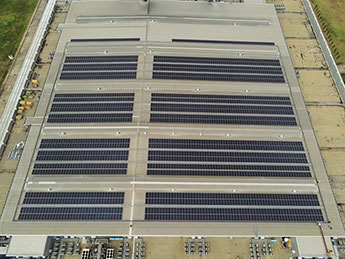
RLN sells electricity to corporate customers at a lower price than at the market by providing them with all the services they need for solar power generation - from installation of equipment and systems to subsequent aftermaintenance, for free. In Mexico, we are conducting a feasibility study of a distributed solar power generation business in the Lintel Industrial Park. In response to the recent global increase in environmental awareness, we are aiming to build a new distributed solar power generation business in Thailand and Mexico in order to improve infrastructure services within industrial parks through the supply of lower-cost power, in addition to satisfying an increasing need for clean energy.
Joint Research on Cotton with Punjab Agricultural University in India

NST’s Textile Business Division is strengthening sustainability efforts in the supply chain of apparel products. Based on the basic research of Dr. Sakae Suzuki, an associate professor at Tokyo University of Agriculture and Technology, which includes tissue culture technology in plants and gene isolation and analysis technology for pigment synthesis, we are conducting research on unconventional high-chromatic cotton in collaboration with the Punjab Agricultural University, which has extensive research facilities and farms in India, the major producer of cotton.
Originally, cotton produces white seeds, but in this joint research, we are aiming to develop cotton that will produce unconventional, high-chromatic seeds such as red and yellow seeds. This development enables the production of yarn, fabric, and clothing that skips the dyeing process required for normal clothing production. Our target is to produce seeds that can be cultivated on a large scale by 2024. When commercialized, it will become possible to produce and supply environmentally friendly clothing without producing waste liquids generated by dyeing.
As a trading company that supplies clothing in Japan and overseas, we aim to build a more environmentally friendly supply chain, further contributing to society.
